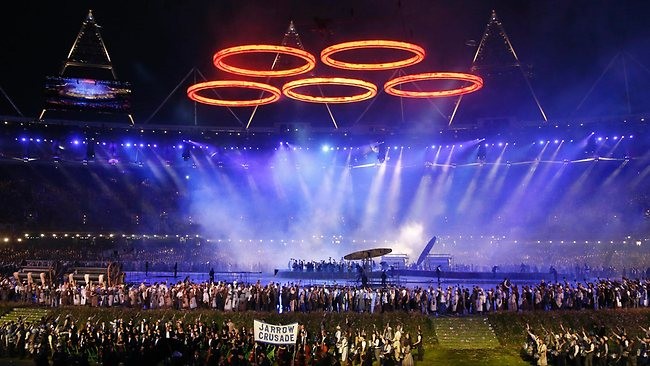
The older I get, the more cynical I become when it comes to the Olympic Games. Too much flag-waving. Over-enhanced drama. And money, money, money. (I’d like a dollar for every Coca-Cola commercial you see over the next two weeks.) But then the Opening Ceremonies are televised, a parade of athletes — most of them anonymous — enters a single stadium, and I’m hooked once more.
With memories of seven Summer Games dancing in my head, the least I can do is provide some tips on how best to enjoy the London Olympics. And how to properly measure Olympic achievement.
• Forget the medal count. Standings at the Olympics are meaningless. Google a ranking of countries by population and you’ll see a reasonable forecast for the final medal count, topped by the United States, China, and Russia (in some order). The Cold War is over, friends. Watching your favorite swimmer beat a chemically enhanced East German . . . that was 1984. And Russians these days share a common enemy with the U.S.: a knocked-to-its-knees economy. Cheer your favorite athletes, but allow yourself to be surprised by rooting for that incomparable Chinese gymnast, or the Italian cyclist with a name that rolls off your tongue.
• There are two kinds of Olympic heroes, and only two. The first we’ll call the Scripted One. These are typically a runner or swimmer we all know will win multiple medals (most of them gold) before the Olympic torch is lit. Carl Lewis in ’84, Michael Phelps four years ago. This year’s U.S. team is surprisingly low on Scripted Ones (though Phelps is back, four medals shy of 20 for his career). Gymnastics is the summer version of figure skating, and surely one of the young ladies flipping, leaping, and bouncing her way to gold will be selling a major soft drink by September. (Best bets: Jordyn Wieber and Gabby Douglas.)
The other kind of hero is the Sweet Surprise. Think Mary Lou Retton in ’84 (yes, a gymnast) or wrestler Rulon Gardner in 2000 (for my money, the greatest Olympic upset since the 1980 U.S. hockey team). If it’s not the gymnastics team that provides this personality, look for an undersized boxer or a distance runner who comes from behind on the final lap. They’ll be the athletes making cross-country tours this fall.
• Tolerate judges. I happen to prefer sports where you can keep score at home. I like a point total, or a clock. I love Olympic weightlifting, believe it or not. A lifter can either clean-and-jerk that barbell — twice his own weight — or he cannot. Weightlifting is dramatic, quick, and excruciating to watch. (And any sport with “clean-and-jerk” and “snatch” a part of its lingo deserves more attention.)
Olympic gymnastics is immensely popular. So is diving. Watch these sports for the personality sagas, but I defy you to measure the difference between a gold-medalist on the balance beam and the silver-medalist. As for jumping from a platform 10 meters above a pool and entering the water without a splash … every diver deserves a medal for not being dragged out of the pool with a hook.
• “Major sports” are secondary at the Olympics. Tennis has Wimbledon. (This year, Olympic tennis will actually be played on the hallowed grounds.) Soccer has the World Cup. Basketball has the Miami Heat. Truth be told, when Kobe Bryant receives his gold medal in London, it will likely be packed with his socks for the trip home. Hats off to Kobe for joining the NBA p.r. tour, but he measures himself by the games he plays in June, not August.
With the number of events available over this fortnight, you can comfortably ignore these “majors” and find yourself with memories that may, in fact, stand out four years from now. I’ll be checking for coverage of water polo (requiring the athleticism of basketball, with the possibility of drowning). And I love old-fashioned, indoor volleyball. As Yogi Berra might say, it’s the best spectator sport that nobody watches.